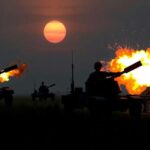Myanmar Military Designates Key Ethnic Armed Groups as ‘Terrorists’
On September 2, the Myanmar military officially classified three prominent ethnic armed groups as “terrorist” organizations. This classification affects the Myanmar National Democratic Alliance Army (MNDAA), the Ta’ang National Liberation Army (TNLA), and the Arakan Army, as reported by the state-run media outlet, Global New Light of Myanmar, on Wednesday.
Under the stringent provisions of the Anti-Terror Law, any form of membership or communication with these designated groups is strictly prohibited. Senior General Min Aung Hlaing, the leader of the military’s State Administration Council (SAC), proclaimed that individuals who engage with these so-called terrorists would also be implicated in terrorist activities.
These ethnic armed groups have formed a coalition known as the Three Brotherhood Alliance, launching significant offensives in late 2022 aimed at dethroning the military regime that assumed control following the February 2021 coup. Their military operations have extended across northern and western Myanmar, particularly along the borders with China and Thailand, as well as within the Rakhine State. Crisis Group, a renowned conflict research organization, noted that by the end of August, the Arakan Army appeared to have established dominion over regions inhabited by approximately one million residents.
Additionally, the People’s Defence Forces (PDFs), which consist of civilians who have taken up arms in opposition to the military, have made considerable strides in the central Mandalay region. The PDFs were established in 2021 by the National Unity Government (NUG), a coalition of elected officials and activists in response to the military’s violent suppression of mass protests. Notably, the SAC designated the NUG as a “terrorist” entity in May 2021, to which the NUG has countered by referring to the military as “terrorists.”
The designation of terrorist status is not novel for the Arakan Army; under the democratically elected government of Aung San Suu Kyi, the group was similarly labeled a terrorist organization. Nevertheless, following the coup, the military rescinded this classification two months later, backtracking on their stance as a result of an existing ceasefire agreement with the group, which ultimately fell apart.
According to the Assistance Association for Political Prisoners, a local monitoring organization, the aftermath of the coup has been devastating, with over 5,599 individuals reported killed and more than 20,000 detained as a result of the ongoing conflict. The humanitarian situation remains precarious, underscoring the urgent need for a resolution in Myanmar’s protracted conflict.







Post Comment